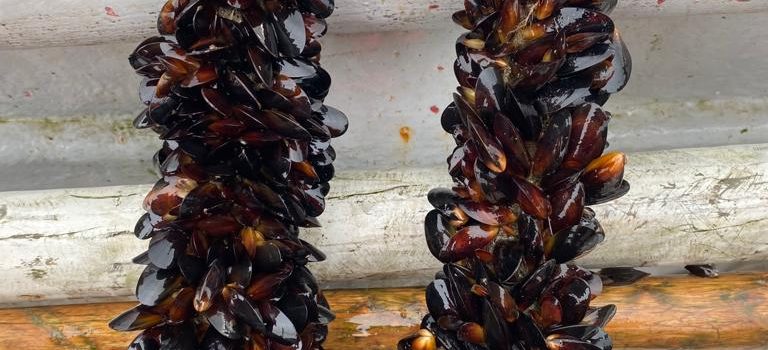IFOP held a Dissemination workshop on mussel seeds larvae and collection monitoring
August 17th, 2023Fisheries Development Institute (IFOP), held a workshop to disseminate “Monitoring and surveillance program on mussels larval availability for the aquaculture activity sustainability in southern zone of Chile, X stage 2022-23 ”, research results that has been carried out since 2013 and that is part of the permanent monitoring programs executed by the IFOP and defined by the Undersecretary of Fisheries and Aquaculture.
The workshop was carried out electronically through Googlemeet platform. With more than 154 attendees, who expressed great interest in what was presented there.
IFOP professionals associated with the monitoring program showed larval monitoring main results and presented presentations focused on describing mussel seed capture activity, from mussel farmers perspective, as well as seed detachments that may reflect capture and efficiency indicators for the industry. In addition, they presented results on larvae abundance in X region de Los Lagos inland sea , mainly in the last season. To end the day, the benefits of “Endemic Seed” interactive platform and its adjustments that also involve applicability information from Surveys of the Mutiliculturist Sector specific objective, which can be perfectly linked with the other elements of the platform, were noted. This platform can be viewed by the community at: https://www.ifop.cl/monitoreo-larvas-de-mitilidos/
Mussel farming; Chilean mussel aquaculture based on spat capture
The Chilean Mussel Industry is established, mainly, in Los Lagos region and in the last two decades it has presented an important growth in its production volume, showing an increase of 1770% since the year 2000 with 23,996 tons to 425,911 tons. in 2021, representing a productive growth of 10.4% compared to the previous year (2020; Sernapesca Statistics 2021). This annual biomass production of mussels in Chile places it as the second producer and the first world exporter of this product.
One of mussel farming main characteristics is that its success depends on seeds (i.e., juveniles) and food (i.e., plankton) coming from the natural environment. In general terms, the practice of collecting seeds from the natural environment to later cultivate and market them is called “capture-based aquaculture” and has certain particularities that must be considered when administering, regulating and managing the activity.
The development of this mussel larvae monitoring program, within the framework of the Permanent Research Program defined in the General Law of Fisheries and Aquaculture of the State of Chile, has been key to gathering the biological-environmental information necessary to characterize natural processes behind mussel farming success , and it is also expected that it will be considered as a State tool to manage and regulate collecting seeds activity . The importance of the existence of permanent monitoring aimed at answering key questions has been recognized in literature for its potential to positively impact natural resources conservation and adaptive management plans implementation, as well as tending to increase efficiency and seed quality, reducing both e detachment losses and accompanying fauna respectively. For those who wish to investigate more, the workshop presentations are offered for download.
For those who want to find out more, the workshop presentations are available for download.
